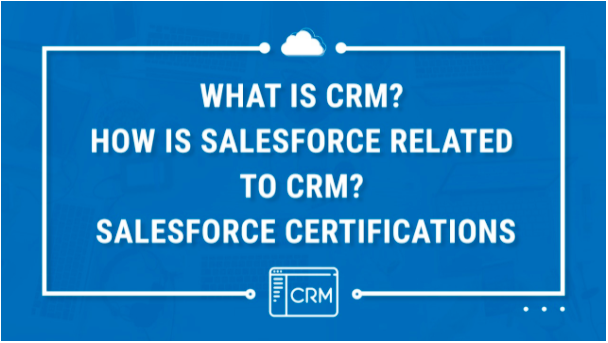Tech
What is CRM? How is Salesforce related to CRM? Salesforce Certifications

What is CRM?
Customer Relationship Management, or CRM, is a platform that can be used by anyone to help improve their interactions with their customers. The modern concept first came into being in the 1980s as businesses started using databases to track customer interactions. However, it can trace its origins to the paper files and records that were maintained by anyone to ensure a personal touch to interactions.
Today’s CRM services are usually hosted on cloud technology, allowing everyone in the company, whatever their jobs and wherever they are, to log in to access and add to records. A modern CRM can manage every aspect of the customer journey, from acquisition and marketing, through to sales, support and beyond.
A well-implemented CRM can improve a company’s bottom-line, helping them to increase sales, but also the customer experience, in turn boosting customer retention.
What is Salesforce?
Salesforce is the world’s leading CRM platform. Used by over 150,000 companies, it is highly scalable, and can grow with a business, even if they become global corporations. A cloud-based CRM, it offers a suite of connected apps, covering marketing, sales, commerce, and customer service.
It also takes advantage of the rich data collected to offer analytics that can be used to boost sales, follow-up with customers and to develop and improve products and services.
It is also one of the most adaptable CRM platforms available. Its Lightning platform makes it easy to create custom applications. And it offers seamless integration with hundreds of other services, and thousands of third-party apps.
Salesforce Certifications?
Like any software or service, it takes a bit of knowledge to get the most of any CRM, even those as well-designed as Salesforce. Anyone looking for jobs working on Salesforce can expect interview questions about certifications.
But training on Salesforce is not just a great way to get ahead in a career, it’s a great way for a business to get ahead as well, ensuring they are getting all they can from their CRM.
Through Salesforce’s Trailhead Academy, there are over forty Salesforce Certifications available, taking users from absolute beginners to Salesforce wizards. These certificates cover every aspect of Salesforce, through five roles: administrator, marketer, architect, developer, and consultant.
Admin certifications will ensure holders can manage their system, helping everyone else get the most out of it. While marketer certification holders can learn how to create unique, targeted campaigns to win customers and sales.
Architect certification training teaches how to design processes to solve problems, while designer certificated staff can amend the UI to make Salesforce as user-friendly and intuitive as possible. And for real power-users, developer certification will prove they have the know-how to extend Salesforce with its Lightning Platform.
Finally, Salesforce offers certification for consultants, showing they can be trusted to who with clients, understand their needs and develop the solutions to address them. Get professional Salesforce certification through practical based training under the guidance of experienced tutors. These Salesforce interview questions will help you further practice.
If you want to get the most out of Salesforce, and see that impact on your bottom line, then getting Salesforce certification is one of the best investments you can make.
Tech
The Importance of Cyber Hygiene: Tips from HelpRansomware Experts

Byline: Katreen David
In the digital age, the adage “an ounce of prevention is worth a pound of cure” has never been more relevant.
For Juan Ricardo Palacio and Andrea Baggio of HelpRansomware, the battle against digital threats is a daily reality. Founded in response to the growing menace of ransomware, HelpRansomware has made it its mission to recover data while educating the public on the importance of cyber hygiene.
“Preventing a cyberattack before it happens is crucial. We can safeguard digital assets more effectively by nipping the threat in the bud through vigilant monitoring and proactive measures,” says Baggio.
The Growing Threat of Cybercrime
Cyber threats have become increasingly pervasive and sophisticated, impacting businesses and individuals alike. According to research, there are an estimated 2,000 cyberattacks per day globally. This equates to over 800,000 cyber crimes annually. In line with this, the worldwide cost of cybercrime is projected to reach the $23 trillion mark by 2027.
This alarming figure highlights the critical need for robust cybersecurity practices. HelpRansomware has responded to this challenge by accentuating the importance of preventive measures. “Our goal is to create a safer digital environment where cyber hygiene is as natural as brushing your teeth,” says Palacio.
Cyber Clean: Maintaining Digital Hygiene
HelpRansomware advocates for a proactive outlook on cybersecurity. It offers practical tips for maintaining good cyber hygiene, such as regularly updating software, using strong and unique passwords, developing risk management plans, and educating employees about phishing scams.
“Cyber hygiene is about taking small, consistent actions to protect your digital assets,” explains Palacio. “When we practice good cyber hygiene, the chances of cyber attacks occurring shrink significantly.”
Businesses can significantly reduce cyberattack vulnerability by integrating these practices into daily routines.
HelpRansomware’s Role in Promoting Cyber Hygiene
Beyond recovery services, HelpRansomware is dedicated to raising awareness and providing education on cybersecurity best practices. It conducts workshops and seminars to help organizations understand the importance of cyber hygiene. This unique initiative mirrors the company’s sincere efforts toward shielding the world from the dark side of the web.
“Education is the first line of defense against cyber threats,” emphasizes Baggio. “Francis Bacon’s famous quote will always ring true in every industry: ‘Knowledge is power’.”
HelpRansomware’s efforts are power moves across the board that help businesses recover from attacks. Its checkmate move, however, is its vision to build a culture of prevention that can safeguard against future threats.
In an era where cyber threats lurk around every unlikely corner of the internet, the importance of cyber hygiene cannot be overstated. Through its innovative solutions and educational initiatives, HelpRansomware is leading the pack in promoting better cybersecurity practices. “We believe that a well-informed and vigilant community can defeat cybercrime,” concludes Baggio.
HelpRansomware’s proactive stance on cyber hygiene is setting new standards in the industry. Through education and preventive practices, Andrea Baggio and Juan Ricardo Palacio are fortifying the digital community, making sure that future cyber threats are met with informed and resilient defenses. Cleanliness matters in both the tangible and digital world.
-

 Tech4 years ago
Tech4 years agoEffuel Reviews (2021) – Effuel ECO OBD2 Saves Fuel, and Reduce Gas Cost? Effuel Customer Reviews
-

 Tech6 years ago
Tech6 years agoBosch Power Tools India Launches ‘Cordless Matlab Bosch’ Campaign to Demonstrate the Power of Cordless
-

 Lifestyle6 years ago
Lifestyle6 years agoCatholic Cases App brings Church’s Moral Teachings to Androids and iPhones
-

 Lifestyle4 years ago
Lifestyle4 years agoEast Side Hype x Billionaire Boys Club. Hottest New Streetwear Releases in Utah.
-

 Tech6 years ago
Tech6 years agoCloud Buyers & Investors to Profit in the Future
-

 Lifestyle5 years ago
Lifestyle5 years agoThe Midas of Cosmetic Dermatology: Dr. Simon Ourian
-

 Health6 years ago
Health6 years agoCBDistillery Review: Is it a scam?
-

 Entertainment6 years ago
Entertainment6 years agoAvengers Endgame now Available on 123Movies for Download & Streaming for Free
